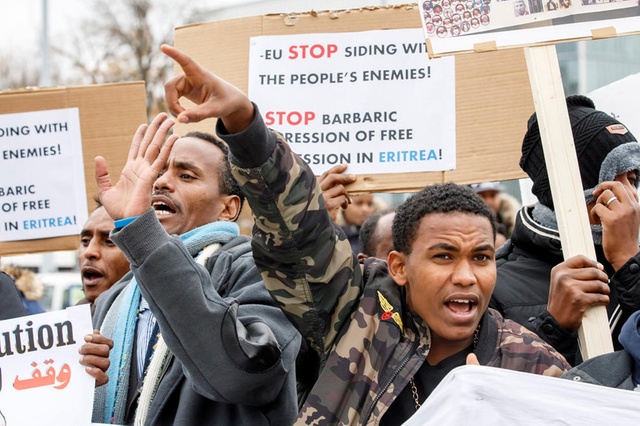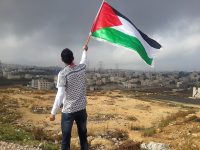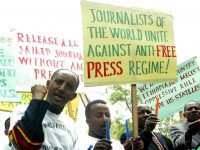On 29th November 1947, by Resolution 181, the UN General Assembly (UNGA) adopted the Partition…

Eritrea, Amnesty Condemns the Escalations in Repression Against Opposers Abroad
Representatives and supporters of the Eritrean government, recently elected as a member state of the United Nations Human Rights Council, threaten and target human rights defenders (HRDs) and activists abroad who criticize the oppressive regime in Asmara.
Amnesty International denounced it today in the report, “Eritrea, Repression Without Borders”.
According to the organization’s brief, the countries in which Eritrean human rights defenders are under the greatest risk are Kenya, Norway, Holland, the United Kingdom, Sweden and Switzerland. The list of people targeted include Father Mussie Zerai, who was nominated for the Nobel Peace Prize, and former BBC Africa Editor, Martin Plaut.
“For many HRDs, fleeing Eritrea has not provided them with much respite from the repression many people die trying to escape. They have to constantly look over their shoulders and watch every word they say, afraid of the long arm of the Eritrean government which evidently extends across borders,” said Joan Nyanyuki, Amnesty International’s Director for East Africa, the Horn and the Great Lakes.
Supporters of the ruling party and Eritrean government officials use scare tactics on anyone who criticizes President Isaias Afewerki’s government and its human rights violations. From death threats to physical violence, to spreading false accusations.
The report examines the period from 2011 to May 2019 and also highlights the use of the youth wing of the governing party in Eritrea to “fight the enemy abroad” in Europe and the USA by spying on Eritreans of the diaspora.
In April of this year, the Minister of Information, Yemane Gebre Meskel, and the Ambassadors to Japan and Kenya, Estifanos Afeworki and Beyene Russom, wrote threatening, intimidating and disparaging posts on twitter against organizers and participants of a conference held in London on ‘Building Democracy in Eritrea’. In his tweet, Minister Gebre Meskel defined the organizers, “Eritrean quislings”.
“Such Twitter tirades by government officials clearly show the Eritrean authorities’ intolerance of dissent and criticism by anyone anywhere, even at a time when the country is a member of the UN Human Rights Council,” said Nyanyuki.
The Role of Supporters of the Ruling Party
Supporters of the ruling party, the People’s Front for Democracy and Justice (PFDJ), and notably its youth wing, the Young People’s Front for Democracy and Justice (YPFDJ), are at the forefront of the attacks against human rights defenders and activists in Europe.
In 2016 a Dutch court ruled as follows on a defamation case:
“…YPFDJ receives instructions from the PFDJ, that the YPFDJ has (support of) the regime of Afwerki as its goal and that members of the YPFDJ are acting as informants for (the embassies of) the regime in Eritrea. The YPFDJ can thus, at this point, be called the extended arm of a dictatorial regime.”
Winta Yemane was born in Italy and she is proud of her Eritrean heritage. She joined the youth wing in high school and in 2011, she participated at the annual conference in Oslo, Norway. When she spoke out for her hopes of a constitution founded on human rights and an independent judiciary, she quickly found herself on the opposing side of the senior government officials at the meeting.
“The officials said that I am a victim of misinformation by the western propaganda and enemies of Eritrea. They also said that my comments do not have weight because I am a minor. Three of the organizers even threatened to throw me out of the conference,” Winta said.
When she returned to Milan, she was stalked for two weeks, received threatening telephone calls from unknown callers and was the victim of a smear campaign on social media.
Many other Eritreans of the diaspora, including Daniel Mekonnen, Director of the association of Eritrean lawyers in exile, and Father Mussie Zerai, nominated for the Nobel Peace Prize in 2015 for his work with migrants, also received similar threats and underwent harassment.
However, this behaviour is not limited to Eritreans. On November 30, 2018, former BBC Africa Editor, Martin Plaut was lured into a meeting with an “Eritrean source” at the British Library in London. A bucket full of liquid was thrown over him and he was called a “traitor” for his investigative journalism into human rights in Eritrea. The Eritrean ambassador to Japan, Estifanos Afeworki, later posted a tweet expressing his appreciation of the attack.
“Subversives and Terrorists”: Eritrean in Exile in Kenya
In 2013, following an initiative to establish a civic organization in Kenya called, the Eritrean Diaspora for East Africa (EDEA), the Eritrean Embassy revoked the passport of the President and Co-founder, Hussein Osman Said, and had him arrested in South Sudan claiming he was a terrorist intent on sabotaging the Eritrean government.
EDEA representatives told Amnesty International that when they tried to launch the organization in February 2015, two people who identified themselves as members of Kenya’s National Intelligence Service ordered them not to proceed with the event because they had learned that the organization’s objective was to overthrow the Eritrean government.
The unsubstantiated accusations continued until 2017 when the Eritrean Embassy wrote to the United Nations Office in Nairobi alleging that 13 guests to an art exhibition were “subversives”. The United Nations prohibited the 13 guests from entering the UN facility where the exhibition took place.
“Eritrea’s use of its embassies abroad to harass and repress its critics must not be allowed to continue,” concluded Joan Nyanyuki.





